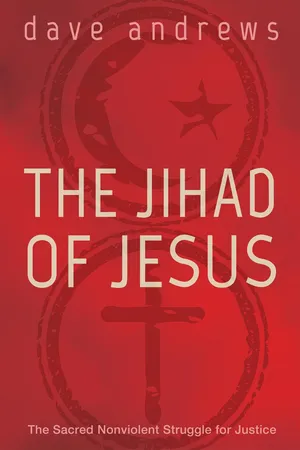
- 188 pages
- English
- ePUB (mobile friendly)
- Available on iOS & Android
About this book
We are caught up in the cycle of so-called "holy wars." In The Jihad of Jesus, Dave Andrews argues that while this inter-communal conflict is endemic, it is not inevitable. Depending on our understanding, our religions can be either a source of escalating conflict or a resource for overcoming inter-communal conflict; and for our religions to be a resource for overcoming conflict, we need to understand the heart of all true religion as open-hearted compassionate spirituality. In the light of an open-hearted compassionate spirituality, we can reclaim the word "jihad" from extremists who have (mis)appropriated it as a call to "holy war," and reframe it, in truly Qur'anic terms, as a "sacred nonviolent struggle for justice"; and we can reconsider Jesus, as he is in the Gospels, not as a poster boy for Christians fighting crusades against Muslims, but as "a strong-but-gentle Messianic figure" who can bring Christians and Muslims together. As this book shows, many Christians and Muslims have found Isa (Jesus) and the Bismillah (celebrating the mercy, grace, and compassion of God) as common ground upon which they can stand and work for the common good. The Jihad of Jesus is a handbook for reconciliation and action: a do-it-yourself guide for all Christians and Muslims who want to move beyond the "clash of civilizations," join the jihad of Jesus, and struggle for justice and peace nonviolently side by side.
Frequently asked questions
- Essential is ideal for learners and professionals who enjoy exploring a wide range of subjects. Access the Essential Library with 800,000+ trusted titles and best-sellers across business, personal growth, and the humanities. Includes unlimited reading time and Standard Read Aloud voice.
- Complete: Perfect for advanced learners and researchers needing full, unrestricted access. Unlock 1.4M+ books across hundreds of subjects, including academic and specialized titles. The Complete Plan also includes advanced features like Premium Read Aloud and Research Assistant.
Please note we cannot support devices running on iOS 13 and Android 7 or earlier. Learn more about using the app.
Information
The Jihad of Dajjal
Remembering Our So-Called Christian “Holy Wars”
Table of contents
- Title Page
- Foreword
- Preface
- Acknowledgements
- Introduction
- Part One: The Jihad of Dajjal
- Part Two: The Jihad of Isa
- Conclusion
- Afterword
- Bibliography